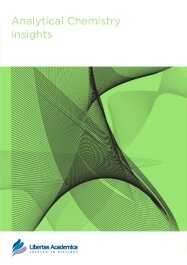

Publication Date: 01 Mar 2011
Type: Original Research
Journal: Analytical Chemistry Insights
Citation: Analytical Chemistry Insights 2011:6 15-20
doi: 10.4137/ACI.S5948

The present study describes a simple and highly selective method for separation, preconcentration and spectrophotometric determination of extremely low concentrations of lead. It is based on flotation of a complex of Pb2+ ions and Alizarin yellow between aqueous and n-hexane interface at pH = 6. The proposed procedure is also applied for determination of lead in both tap water and prepared sea water samples. Beer’s Law was obeyed over the concentration range of 3.86 × 10–8 To 8.20 × 10–7 molL-1 (8–170 ngmL-1) with an apparent molar absorptivity of 1.33 × 106 molL-1 cm-1 for a 100 mL aliquot of the water sample. The detection limit (n = 10) was 8.7 × 10–9 molL-1 (1.0 ngmL-1) and the Relative standard deviation (R.S.D), (n = 10) for 7.2 × 10–7 molL-1 (150 ngmL-1) of Pb (II) was 4.36%. A notable advantage of the method is that the determination of Pb (II) is free from the interference of almost all cations and ions found in the environment and waste water samples. The determination of Pb (II) in tap and synthetic seawater samples was also carried out by the present method. The results were satisfactorily comparable so that the applicability of the proposed method was confirmed to the real samples.
Note:
This article is subject to an erratum: Analytical Chemistry Insights 2011:6 45.
PDF (565.34 KB PDF FORMAT)
RIS citation (ENDNOTE, REFERENCE MANAGER, PROCITE, REFWORKS)
BibTex citation (BIBDESK, LATEX)


I have published more than thirty research papers in internationally reputed high impact factor journals including Libertas Academica publications, Proteomics Insights and Analytical Chemistry Insights. I have no hesitation in saying that Proteomics Insights is highly efficient for its rapid and high quality review process and keeping the authors informed at each stage of the publication process. I recommend this journal for students, teachers and research workers who wish to publish their work. ...
Facebook Google+ Twitter
Pinterest Tumblr YouTube